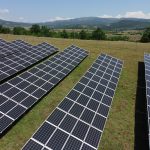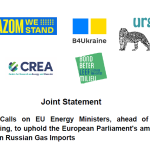Dear Commissioner Vella,
On 28 April the Commission will seek the approval of the Industrial Emissions Directive (IED) Article 75 Committee for a revised version of the so-called ‘LCP BREF’ industrial standards document. It is essential that no last-minute changes are made to weaken the final draft of this document, which was agreed by consensus at the IED Forum meeting in October 2016.
EU citizens expect the European Commission to protect their rights, even when their own governments fail them. Most recently, people across Europe have welcomed the Commission’s success in tackling national inaction on air pollution at the European Court of Justice and in the last weeks more than 100,000 people have signed a petition calling on their governments to back stricter EU coal pollution limits.
The Industrial Emissions Directive aims to reduce the impact of industrial activities on the environment by ensuring the use of ‘Best Available Techniques’ (BAT). For more than six years, experts from Member States, industry and environmental NGOs have taken part in the ‘Sevilla Process’, to assist the Commission in producing a revised BAT reference document (BREF) containing environmental guidelines for Large Combustion Plants (LCPs).
The revised LCP BREF will provide binding guidelines to assist Member States in reducing harmful emissions. Applied to coal plants alone, the October draft could save more than 20,000 lives currently cut short by the most polluting plants each year.
As environmental NGOs we have engaged in the Sevilla Process in good faith and, although more ambition could have been shown, we believe that the final agreed draft of the LCP BREF constitutes a reasonable compromise.
We are therefore extremely concerned by reports that last minute changes are still being requested by Germany and Poland. The widely-publicised German attempt to relax the NOxlevel for existing lignite, to the benefit of the dirtiest plants in Europe, was rejected by the
Forum meeting last October.
Weakening proposed limits for Europe’s most polluting power plants would send a dangerous message to EU citizens that their health and environment is less important than the profitability of Europe’s most outdated and underperforming plants. Rewarding the operators of these plants punishes better performers and blocks investment in cleaner technologies; it runs counter to both the Commission’s commitments on climate change and the aim and purpose of the BREFs.
We therefore urge you to ensure that the Commission stands firm against any possible threat by Member States to block the adoption of the BREF unless last-minute amendments are made. Giving in to such apparent blackmailing would clearly undermine the Commission’s claim that BREFs are “determined in a transparent manner, based on sound techno-economic information” and reflecting a consensus of the stakeholders involved in the process.
Germany’s request is especially unnecessary given that the IED (Article 15.4) allows for exceptions to be granted to BREF limits, on a case-by-case basis and subject to public scrutiny, where costs are shown to be disproportionate to the benefits. The Commission must make it clear to Member States that this, and not last minute attempts to make amendments at the Committee stage, is the correct process for any instances where genuine technical or economic obstacles stand in the way of meeting the BREF’s upper emission levels. The BREF review rules should also be updated to make this explicit and to prevent techno-economic exceptions from being included in the footnotes of future BREFs.
Weakening the final draft of the document at this point would have serious repercussions for the integrity and continuation of the Sevilla Process and be contrary to the spirit and procedures agreed under the Industrial Emissions Directive.
Worrying parallels could be drawn between this case and an earlier unfortunate episode when, in 2013, the German government was able to undermine new rules for car emissions. This enraged citizens across Europe and questioned the credibility of EU environmental law; such a situation cannot be allowed to occur once again.
Yours sincerely
Jeremy Wates Secretary General, European Environmental Bureau
On behalf of the Green 10 group of Environmental NGOs:
Angelo Caserta, Regional Director, BirdLife Europe
Wendel Trio, Director, Climate Action Network Europe
Mark Fodor, Executive Director, CEE Bankwatch Network
William Todts, Executive Director, European Federation for Transport & Environment (T&E)
Magda Stoczkiewicz, Director, Friends of the Earth Europe
Jorgo Riss, Director, Greenpeace European Unit
Génon K. Jensen, Executive Director, Health & Environment Alliance
Andrea Lichtenecker, Executive Director, Naturefriends International
Geneviève Pons-Deladrière, Director, WWF European Policy Office
And:
Stefan Larsson, Director, AirClim
James Thornton, CEO, ClientEarth
Pavel Franc, Programme Director, Frank Bold Society
Jiří Koželouh, Campaigns Director, Hnuti DUHA
Ana Barreira, Director, Instituto Internacional de Derecho y Medio Ambiente
Rachel Solomon-Williams, Managing Director, Sandbag
Genady Kondarev, Member of the Board, Za Zeminata



